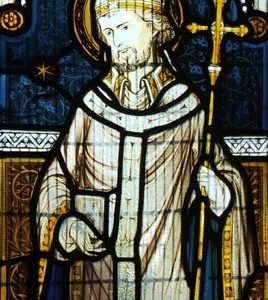“O Come, O Come, Emmanuel” is a beautiful hymn that we hear frequently throughout Advent. It has seven verses, each of which come from one of the O Antiphons. These are seven antiphonal prayers specifically used during the Church’s evening prayer from December 17 to 23, leading up to the Nativity of Our Lord. The O Antiphons look back through the history of salvation presented in Sacred Scripture, and they cry out for the long-expected Messiah who is the culmination of that history. Praying with these titles and antiphons has the potential to make Advent deeply memorable. Every time we hear these words and images, or sing the hymn, our expectation of God-with-us is kindled. This series of reflections is offered in hopes that individuals and families will be ready to pray the O Antiphons in the final week before Christmas eve; that they will be able to savor the birth of Emmanuel in that Bethlehem stable.
O Emmanuel, our King and Giver of the Law: come to save us, Lord our God!
The last of the O Antiphons is the culmination of them all. All the previous themes of the antiphons, wisdom and radiant light and kingly authority and law, take on flesh in Emmanuel, the Incarnate King who will bring the salvation and liberation that previous antiphons have besought.
This antiphon calls out to “our King and Giver of the Law.” This is very specifically meant to connect the long-awaited Messiah to Moses, the giver of the first law, and David, the great king of Israel. In very real ways, those two ancient men facilitated the salvation of Israel, specifically by fostering God’s presence with the nation. For example, while Israel prepares for entry into the Promised Land, Moses proclaims to them a message from God: “It is the Lord who goes before you; he will be with you, he will not fail you or forsake you; do not fear or be dismayed” (Dt. 31:6-8; emphasis added). King David also receives a message for the nation from God: “I have been with you wherever you went, and have cut off all your enemies from before you…” (2 Sam. 7:9; emphasis added). While God’s presence is real in these moments and situations, it remains spiritual. It remains something that can be difficult to define or grasp.
It is with the prophets that we see something new, something more tangible. In their messages we begin to witness the expectation of an incarnate person bearing the Lord’s presence. Isaiah speaks to King Ahaz: “Therefore the Lord himself will give you a sign. Behold, a virgin shall conceive and bear a son, and shall call his name Emmanuel” (Is. 7:14). The prophet Zephaniah speaks a message that describes several ways that God will provide salvation:
“The Lord, your God, is in your midst, a warrior who gives victory…. Behold, at that time I will deal with all your oppressors. And I will save the lame and gather the outcast, and I will change their shame into praise…. At that time I will bring you home…when I restore your fortunes before your eyes…” (Zeph. 3:15-20).
According to this prophecy, God-with-us is a warrior, a gatherer, and a healer. He also builds up a renovated and restored home. Taken together, these show us all the ways that God intends to save His people.
Another Old Testament prophecy conveys a vision of a new law given by the Almighty God. On behalf of the Lord, Jeremiah speaks, “I will put my law within them, and I will write it upon their hearts” and “I will forgive their iniquity, and I will remember their sin no more” (Jer. 31:33-34). This new law will be granted to the people, providing salvation and healing in a new and unexpected way.
As we have seen with all the other prophecies from the Old Testament, these messages are fulfilled in Jesus of Nazareth, the Incarnate Word of God. From St. Joseph’s memorable and miraculous dream, recorded in the first chapter of St. Matthew’s Gospel, we learn that the Child conceived by the Holy Spirit is the fulfillment of Isaiah’s prophecy of Emmanuel; and we learn that he is to be named Jesus, “for he will save his people from their sins” (Mt. 1:18-23). From the first moments of his public ministry, Jesus teaches that he has been sent “to proclaim release to the captives and…to set at liberty those who are oppressed” (Lk. 4:18). As the Lord prepares to enter his sacred Paschal Mystery, Jesus tells his apostles of a new law of love and a new commandment that is fulfilled in laying down one’s life for another (Jn. 12:32-34; 13:34-35).
Still, the idea of God-with-us, means more than walking among us, looking like us and providing mystical teachings. It means that he became like us in all things but sin, so that all we experience can be redeemed. St. Paul writes that Jesus “emptied himself, taking the form of a servant, being born in the likeness of men. And being found in human form he humbled himself…” (Phil. 2:7-8; see also Heb. 4:14-16). The liberation that this Messiah provides goes much deeper than intellectual, political, or social revolution. He brings freedom from sin along with emotional and spiritual healing and wholeness. His Crucifixion and Resurrection, of course, are the source of that liberation.
Ultimately, God’s revelation exhibits that He wants to be with us in our humanity, despite the fact that each of our lives is full of strain and suffering. He wants to be with us so much that He takes on our suffering and death. Most importantly, and miraculously, He wants to be with us so much that death cannot hold Him bound. Thus, he throws open the tomb to give us access to eternal life. That mystery and miracle of salvation begins when He takes on human nature and is born in Bethlehem; when he is born as Emmanuel, the newborn King and the Giver of the New Law.
Image by artin1 on Shutterstock












